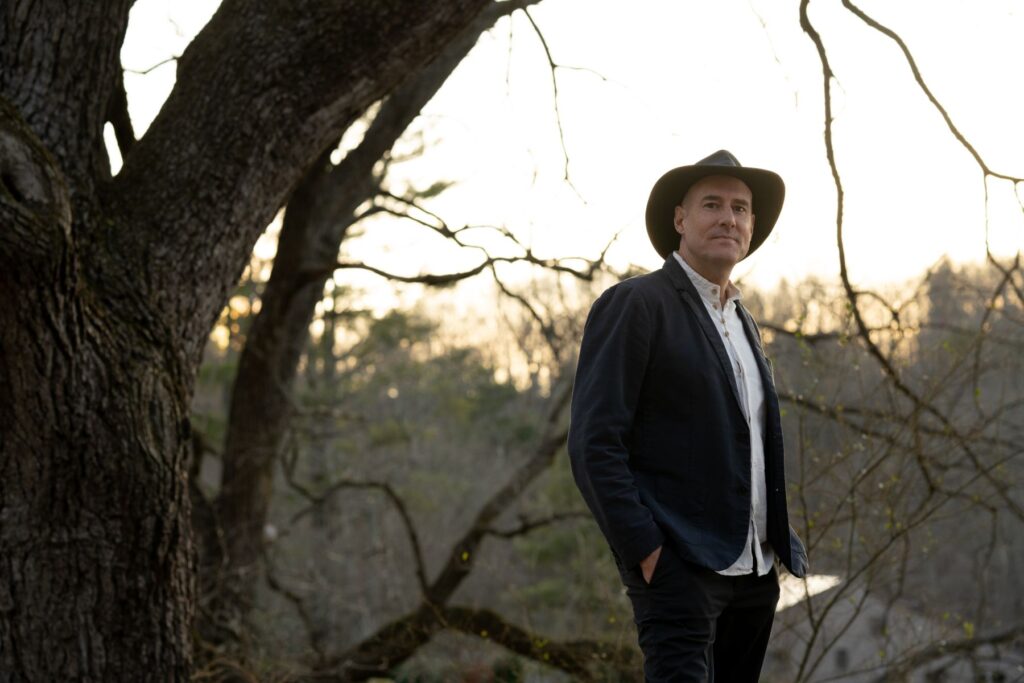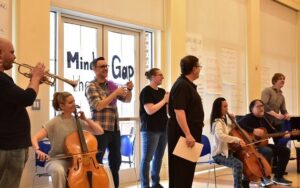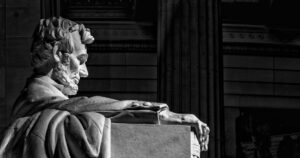For David LaMotte, music and bridge-building have always gone hand in hand.
When casual gigs in college made him realize music’s potential to transform hearts, David worked quickly to become a full-time performer—”the rare musician whose dreams actually came true.” Thirty years and 3,000 concerts later, David is soon putting out his thirteenth album, Still. The album features several songs oriented toward brotherhood and conflict management.
He’s endlessly interesting—the kind of guy whose idea of a perfect honeymoon was to go to language immersion school in Guatemala with his bride, if that gives you any idea. He’s an author, the president of a nonprofit, a consultant for the North Carolina Council of Churches, and a former chair of a Nobel Peace Prize nominating task group. David the very embodiment of what I call an “artist and _____” (see my recent Coleman Hughes interview for more on that concept). If you want to understand how David’s varied passions intersect, his 2018 TEDx talk on music, peace, and conflict is a good primer.
Follow David’s journey by visiting his website, where you can stay up to date on his upcoming music, books, and other bridge-building endeavors. You can also support him on Patreon and find his music on Apple Music, Spotify, YouTube, and all major streaming platforms.
Background
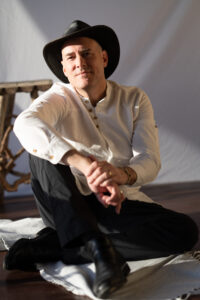 Alma Cook: Thanks for joining us, David! What’s your origin story? How did you become the musician you are today?
Alma Cook: Thanks for joining us, David! What’s your origin story? How did you become the musician you are today?
David LaMotte: I’m the youngest of four siblings, and there’s a six-year gap between me and my nearest sister. I grew up listening to their music, so it left me a half-generation off in terms of the music I was listening to. The 70s folk-pop revival—with lyrics that mattered, lots of harmony, and acoustic foundations—was music that really spoke to me. Jackson Browne, Carole King, Neil Young, on and on. It’s natural, I think, when music moves you, to want to do that for other people, to have that same effect.
In college, I became passionate about community mediation, which is really conflict resolution work on a local scale. I felt drawn to that work after I graduated, but I had also begun to gig out a little in college, and to my amazement, people seemed to like it. Occasionally, there were tears in people’s eyes at the shows, and it felt like it mattered. So I gave myself two years to work toward being able to go full-time as a performing songwriter. Four months later, in January of 1991, I quit my last side job. I’ve been a full-time musician since then, aside from a two-year break to get a master’s degree and a year working for the NC Council of Churches on peace and justice issues, both things that called to me even though things were going well with music. I feel extraordinarily fortunate. I’m the rare musician whose dreams actually came true.
At this point, I’m putting out my thirteenth album, and I’ve performed over 3,000 concerts in all 50 states and on 5 continents, touring Europe a dozen times and Australia/New Zealand a half-dozen times. It’s been a grand adventure, and it still is.
AC: Tell us about your background in community engagement—including your experience with international peace work—and how this has shaped your worldview.
DL: As my music career developed, I became aware of the power in that platform. It’s pretty rare to get rich or famous as a folksinger, and I am neither, but I do have a small and dedicated audience that is listening to what I say and sing, and I’m grateful to have the chance to call people’s attention to things that matter.
When my wife and I got married in 2004, we decided that the most fun thing we could think of to do for our honeymoon was to go to language immersion school in Guatemala. We were not looking for a project when we went there, but we made some friends, and those friends asked us to help out raising money for a school project. Out of that, we gradually started a nonprofit, PEG Partners, that works with arts, education, and mentoring in Guatemala, supporting and partnering with Guatemalan educators and community leaders who are doing great work in their own communities. Eighteen years later, PEG continues to be a big part of our lives, and I’ll be traveling to Guatemala twice this summer.
In 2009, I took a two-year break from music so that I could go to Australia and do a master’s degree in International Studies, Peace, and Conflict Resolution from the University of Queensland as a Rotary Peace Fellow. As a part of that time, I spent three months in rural India working with an Indian sustainable development organization, and I learned a great deal from those courageous folks.
Returning from Australia, I worked with the NC Council of Churches for a year as their program associate for peace. During that time, I did some work in support of the Moral Monday movement in North Carolina, getting arrested a couple of times for protests at the legislature. Shortly after that, I began a term on the AFSC Nobel Peace Prize Nominating Committee, which I served on for six years.
In the time since, I’ve published a book on social change and a children’s book about creative nonviolence. I’ve kept performing, and I’m involved in supporting various local and regional organizations working for food security, racial equity, and immigrant support.
After the 2016 election, so many people seemed afraid to talk with each other, and I suggested to my family that we put some kind of sign on the house welcoming our neighbors to knock on our door if their car battery is dead, no matter who they voted for. We ended up hanging a banner on the house that made that idea pretty clear, and then created a website because people started wanting their own. Now “Let’s Be Neighbors” banners and signs are all over the country.
I don’t believe that anyone has a calling. I think we all have lots of them. And that’s an important distinction, because it changes the question from “what do I do with my life?” to “what do I do next?”—which is a much more practical, life-giving, and effective question to ask.
I don’t believe that anyone has a calling. I think we all have lots of them. And that’s an important distinction, because it changes the question from “what do I do with my life?” to “what do I do next?”—which is a much more practical, life-giving, and effective question.
David LaMotte Tweet
AC: In light of this, how did you come to discover Braver Angels?
DL: Braver Angels is one of the very few organizations out there that acknowledges that relationship comes before transformation—that our best hope for healthy community is to humanize each other, not for the purpose of converting people, but so that all of us can grow in our understanding and find a way forward together, with respect and even affection, even when we continue to disagree. I began to see Braver Angels’ work online not long after it began in 2017, partly because friends who came across it knew I would be excited about your work, and passed it on to me.
Deep Dive
AC: You’ve got more than a few songs that explicitly focus on bridge-building—including some off your new album, if I’m not mistaken! Pick a couple of your favorites and talk to us about what inspired you to write them.
DL: “Here For You,” from my new album, Still, was the first song I wrote which explicitly addressed the pandemic and what it meant to be community in this strange time. My friend Gareth Higgins offered some guiding words that have been really important to me. I paraphrased his “rules for community” in the lyric “bring what you can offer, and ask for what you need.” In a scary time, we have a tendency to either pull away in fear, or lean toward each other for support. I think we’re better off if we do the latter, and I wanted to offer that encouragement.
“The Way It’s Done,” also on the new album, is a cautionary tale about arguing. More specifically, it’s a song about dumb things that couples argue about. I crowdsourced it on Facebook and got lots of great suggestions. It’s mostly just to make folks laugh, but I do sometimes catch myself thinking something along the lines of the words in the song’s chorus—“the way it’s done is the way I do it, and the way I do it is the way it’s done”—and it allows me to laugh at myself and saves me from saying it out loud! It seems to me that there is some relevance to political discourse there.
AC: Do you think artists, as public figures, have a responsibility to “speak out” or engage with politics explicitly? Some people seem to love it when celebrities wear their beliefs on their sleeve, while others wish they’d keep these opinions out of their work. What are your thoughts?
DL: I am hesitant to say what responsibilities others have, but I do think I have a responsibility to use whatever tools I have to move things in better directions. Part of that is advocating for policies that make things more safe and more fair for more people. It’s hard to claim to stand for love if you’re unwilling to stand in the way when people are being unfairly marginalized and attacked. That said, when “issues” show up in my songs, I try to approach them artfully, honestly, and with humility. Different lives teach different lessons, I have a lot to learn, and I think art should start conversations, not end them.
I will say that I find it a little strange when people say musicians shouldn’t be political. Democracy works best when we are all political, in the sense that we are showing up for the process of making decisions together about what matters and who matters, which is what “political” really should mean. I don’t know why artists should be excluded from the conversation. If someone’s viewpoint is unappealing, there’s no reason you have to keep listening, but they have every right to offer it. That’s what democracy looks like.
When [political] issues show up in my songs, I try to approach them artfully, honestly, and with humility. Different lives teach different lessons, and I think art should start conversations, not end them.
David LaMotte Tweet
AC: Okay—so I’d be remiss if I didn’t ask about Abraham Jam! What’s the scoop on this super interesting, cross-cultural trio you’re a part of?
Quick Takes
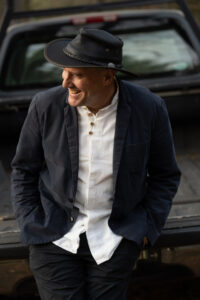 AC: Time for some quick takes! We’ve noticed here at Braver Angels that most artists lean blue (at least the ones we’ve come across—we’re always on the hunt for red musicians)! Do you have any thoughts about why the chips fall this way?
AC: Time for some quick takes! We’ve noticed here at Braver Angels that most artists lean blue (at least the ones we’ve come across—we’re always on the hunt for red musicians)! Do you have any thoughts about why the chips fall this way?
DL: One of the ways to think about the conservative/liberal spectrum is where one draws the circle that defines “us.” Conservatives tend to draw that circle more closely than liberals, and there are arguments to be made for that. I think creative people tend to be curious as to what is on the other side of the boundary, whatever boundary it is, and tend to value what they find there, so it’s kind of natural that creative folks would generally lean toward broader boundaries.
AC: Can you name any musicians across the aisle? Who are your favorite?
DL: My friend Tag Garmin is on the red side of the aisle, and a really good man and a fine musician and songwriter. We disagree profoundly about some very important things, but I would never question his integrity.
AC: Do you have any advice for musicians navigating your local music scene?
DL: I’ll pass on good advice that was given to me: Play anywhere, any time, for any amount of money, until you get busy enough that you can be more selective. You’ll learn a lot about performing from playing challenging settings, and any time your fingers are on your instrument you are getting better at playing. So it’s all worthwhile.
What's Next?
AC: What’s coming down the pike for you, David? Have the last few years inspired any new pieces from you that we can check out?
DL: I’ve just signed a book deal with Chalice Press for a new, updated edition of a book I published a few years ago, under the new title, You’re Changing the World (Whether You Like It or Not). And, of course, I’m really excited about the new album, Still, which is off at the manufacturers right now.
AC: Do you have any ideas for how Braver Angels could be a positive force in the creative community?
DL: I think you’re already doing it, and I’m honored to be a part of this. Braver Angels’ SongSquare events are a lot of fun, as well. I think there’s tremendous potential for convening groups of musicians to open our hearts a little and build community that is strong enough to hold differences of perspective.

